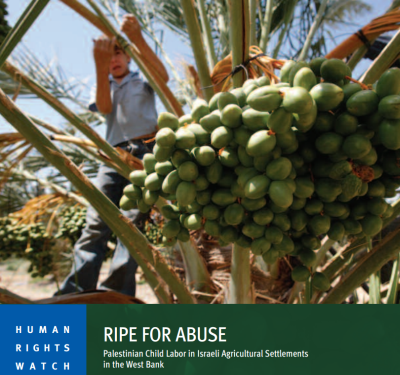Low-Hanging Fruit: Human Rights Watch and Palestinian Child Laborers

“Israel’s a sort of low-hanging fruit” a Human Rights Watch (HRW) board member acknowledged in an illuminating 2010 interview, and the organization’s latest report “Ripe For Abuse: Palestinian Child Labor in Israeli Agricultural Settlements in the West Bank” exemplifies HRW’s skewed and distorted treatment of Israel.
Take, for example, the report’s accompanying publicity video, which got picked up by the Sydney Morning Herald. In the video, HRW researcher Bill Van Esveld claims that Palestinian children “have no option to work on Palestinian farms. Most of them don’t exist anymore.”
But this claim is belied by the facts. The Palestinian date sector has enjoyed significant growth in recent years. According to a report published by Paltrade and the Ministry of National Economy, among others (“The State of Palestine National Export Strategy 2014-2018”):
Palestinian fresh fruit exports have grown at a rate of 52%, compared to global import growth of 21% over the same time period.
The main fruit exports from the State of Palestine are nuts, dates, grapes, strawberries and almonds. The bulk of export growth for the sector has been driven by a rise of exports of dates. Palestinian exports of dates have risen from US$324,000 in 2007 to US$1.2 million in 2010, reflecting an absolute growth of over 250%.
Indeed, Nakheel Palestine for Agricultural Investment, located in the Jordan Valley, “cultivates a total of six Date Palm farms in Jericho, on the Palestinian side of the Jordan Valley, with a total number of 20,000 trees stretched along an area of 3000 Dunums.”
CAMERA has asked HRW to correct Van Esveld’s erroneous assertions that Palestinian children have no choice but to work in Israeli settlements and that “most” Palestinian farms “don’t exist anymore” and to explain why Palestinian children would choose to work in Israeli settlement farms when Palestinian farms are situated nearby.
In fact, our colleagues at UK Media Watch, a CAMERA affiliate, note that David Elhayani, head of the Jordan Valley regional council, denied HRW’s allegations, insisting tha “there were no children among the 6,000 Palestinians” employed by the regional council And they further point out that the photo used on the cover of the HRW report to illustrate the alleged illegal use of child labor by Israeli settlement farms in the Jordan Valley is actually a Reuters photograph by Mohamad Torokman, taken in 2010, that illlustrates work at a Palestinian farm, and not an Israeli settlement.
April 15 Updates: “UK Media Watch prompts correction to Human Rights Watch photo illustrating child labor report” and “UK Media Watch prompts correction to misleading photo illustrating HRW child labor report“
More from SNAPSHOTS
Fatah: A ‘Sea of Blood’ Will ‘Create the State of Palestine’
October 16, 2017
PA President Mahmoud Abbas Fatah is the movement that dominates the Palestinian Authority (PA), the entity responsible for governing the West Bank (Judea and Samaria). Controlled by PA President Mahmoud Abbas, the movement is frequently [...]
Imaginary BDS Demon Gets Haaretz Photo Editor
October 15, 2017
Oct. 17 Update: Haaretz Prints Correction on BDS Activists That Weren't In his Oct. 13 column ("Exorcising an imaginary BDS demon"), Haaretz's David Rosenberg argues that the anti-Israel BDS (boycott, divest, sanctions) movement is an [...]
Where’s the Coverage of Torture in Gaza Prisons?
October 10, 2017
Earlier this month, the online news site Al-Monitor wrote about two Palestinian human rights organizations’ reporting on complaints of torture in Gaza prisons. (“Gaza activists decry rise in torture within prisons,” October 1, 2017.) Al-Monitor [...]
BDS Activist and Media Favorite Uses Las Vegas Tragedy to Attack Israel
October 3, 2017
Munayyer A prominent activist in the boycott, divestment and sanctions (BDS) effort, Yousef Munayyer, used the Oct. 2, 2017 mass shooting in Las Vegas to attack Israel. Munayyer is the executive director of the U.S. [...]


